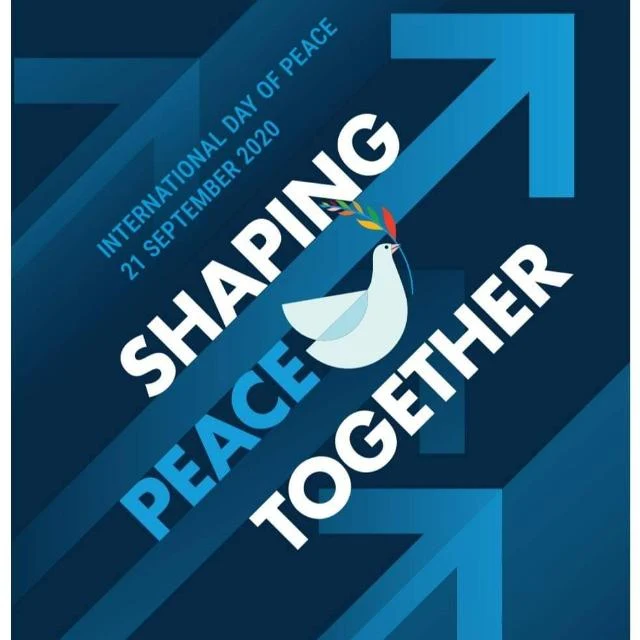Today, the 21st of September, we celebrate the International Day of Peace. This day was created by the UN in 1981, when the organisation devoted itself to worldwide peace and encouraged all of mankind to work in cooperation for peace.This year’s commemoration is focused on “Shaping Peace Together.”
In a world in which war is waged and where there seem to be fewer and fewer islands of security and stability, we not only need decisive action from the international community but also prudent and co-ordinated approaches. For peace will not be achieved with weapons, but with prudent policymaking – policymaking that reaches far beyond the diplomatic negotiating table and is willing to invest in a “peace dividend” for the people in crisis regions.
Peace is not only the absence of war, peace is a concept that affects all parts of society. It is something that we cannot discuss only in times of conflict but something we need to build every day. By acting early through dialogue and mediation we can stop violent conflicts before they erupt. Using military violence must always be the very last resort of political action. The processes that lead to such action must be transparent and democratic. All parties involved must be fully accountable for their actions.
Ensuring due diligence and conflict sensitivity in one’s work is recognised as central to peacebuilding, as are the principles of: inclusiveness, appropriateness or ownership, awareness of socio-political and economic factors, addressing power relations, pursuing accountable governance, building on drivers of peace, or “peace dividends,” and engaging populations.
Building Peace Together is a practical reference for inclusive, long-term responses to today's security challenges. It enables every actor to see their engagement through a peacebuilding lens and makes peacebuilding everyone’s business. Also, during crises, people can come together, see their common humanity, and build a better future together. Or they can give in to fear, sparking outbreaks of violence and years of mistrust. You can make the difference. Give now to keep building peace during war, natural disasters, and other crises. We have to do all we can to promote peace in the world we live in, so that people enjoy the protection of their rights.
Sustainable peace cannot be achieved merely through paper commitments by governments and policy makers to end violence and conflict. Sustainable peace can only be achieved by building a fairer world order and by reducing conflict sources such as poverty, injustice and discrimination. We hope that more and more people realise that without their commitment, we will not come closer to the realisation of peace. In the end, everybody wishes to live in peace which is why we all need to work together to create the world we want to live in.
Sustainable peace can only be achieved when all sides to a conflict have the capacity to find outcomes together. High-level talks between power brokers are just a small part of a complex and inter-linking process. Women, religious, civil society and minority groups not only need you to get their voices heard but be part of the process of resolving conflict together if results are to stick. Amidst violent conflicts, we must highlight our capacity to overcome adversity in the face of Covid-19 and other challenges.
The chances of building a more peaceful world based on inclusivity, human rights and rule of law hinge on our ability to come together through dialogue and understanding.This year’s International Peace Day held on 21 September under the UN’s theme of ‘Shaping Peace Together’ is a day devoted to strengthening the ideals of peace, through observing 24 hours of non-violence and cease-fire.To bring home this point, consider the following questions: Can our families and communities thrive without mutual support and peace with our neighbours? Can peaceful communities exist without attention to justice and equity? What would be the prospects of a world without peace?
As we build ever more powerful weapons with leaps in technological sophistication, we must develop even more powerful means of avoiding their use. So let us consider some of the forces that lead to global instability, along with those that build the foundation for peace, and suggest how you can play a part in shoring up the latter.
Peace enriches our communities and individual lives, as it directs us to embrace diversity and support one another to the fullest extent possible. Through caring, generosity, and fairness we provide a cornerstone for attaining a sustainable, just, meaningful, vibrant, and fulfilling personal and community life. We all have a joint responsibility to build a more peaceful world. This needs to be done together in dialogue across nation state borders and cultural differences.
Promoting peace requires valuing and considering both oneself and others. As such, peace is central to every situation throughout our lives. Just as a child is enriched as he or she learns to take on more responsibilities, the meaning in our lives grows as we learn to recognize and take more responsibility for one another and the world.
Promoting peace is not a solitary activity. We are joined in the effort by the vast majority of people in the world who yearn for peace, and work to live together peaceably. For those times when you may find yourself overwhelmed, there is a saying beautifully voiced by the musical group Sweet Honey in the Rock: “Drops of water turn a mill, singly none, singly none.” If we keep moving forward step by step, together we will carve out the path towards peace dreamed of by Reverend Martin Luther King, Jr., alongside so many others. From finding peace within one's life to demonstrating the greatest compassion and commitment to social justice, extending the principles and the practice of peace to others can guide us to a richer, more secure coexistence.
Happy international Peace day.
By Rose Obah.




Comments